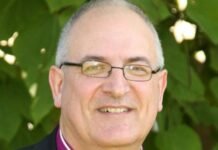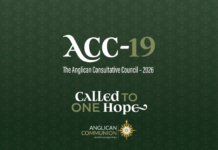Editor’s note: The Standing Committee of the Episcopal Diocese of Fort Worth (ACNA) released a resolution today, affirming its opposition to the consecration of women to the episcopate, and voiced it’s objections to the consecration of Rose Okeno of the Diocese of Butere in the Anglican Church of Kenya last week. Women bishops were not second order issues, the standing committee explained, but matters “necessary to salvation”. Fort Worth’s response was not to break relations with their GAFCON brethren who had consecrated women bishops, but “in an effort to strengthen and not to whither our bonds of affection, we also wish to record our strong objection” to their consecration.
Resolution of the Standing Committee of the Episcopal Diocese of Fort Worth
21 September 2021
Saint Matthew, Apostle and Evangelist
“Beloved, being very eager to write to you of our common salvation, I found it necessary to write appealing to you to contend for the faith which was once for all delivered to the saints” (Jude 3).
In a 2017 communique from the Global Anglican Future Conference (GAFCon), the Primates noted: “It is our prime recommendation that the provinces of GAFCon should retain the historic practice of the consecration only of men as bishops until and unless a strong consensus to change emerges after prayer, consultation and continued study of Scripture among the GAFCon fellowship.” In 2021, the Chairman of GAFCon, Archbishop Foley Beach, noted: “At our meeting, the GAFCon Primates agreed we have not come to a consensus on the issue of women in holy orders, and specifically women in the episcopate.” And yet, three women have been consecrated in the GAFCon provinces of Sudan and Kenya since the moratorium on such consecrations went into effect, despite the lack of consensus.
We enthusiastically support the statement of our own Primate, Archbishop Beach, that “we will continue to stand with these brothers and sisters [of GAFCon] to the greatest extent possible to maintain the Biblical Faith in the Anglican Communion and proclaim the saving Good News of Jesus Christ.” And we enthusiastically celebrate the rich contribution of women vitally engaged with significant impact in the ministry of the church throughout her long history. In an effort to strengthen and not to whither our bonds of affection, we also wish to record our strong objection to the recent consecrations of women in provinces of the Global Anglican Future Conference and to the classification of the action as a “secondary issue.”
Primary and Secondary Issues
“Speaking the truth in love, we are to grow up in every way into him who is the head, into Christ . . . Therefore, putting away falsehood, let every one speak the truth with his neighbor, for we are members one of another” (Ephesians 4:15,25).
In their recent meeting, the primates of GAFCon passed a resolution which noted: “In our discussion, the Primates acknowledged that while there is disagreement and ongoing discussion on the issues of the ordination of women as deacons or priests, and the consecration of women as Bishops, we are agreed that these are not salvation issues and are not issues that will disrupt our mission: to proclaim Christ faithfully to the nations.”
Issues that touch upon the salvation of souls are always primary issues, and certainly not to be considered adiaphora (“things indifferent”). The catechism of the 1662 Book of Common Prayer describes the sacraments of Baptism and the Supper of the Lord as “generally necessary to salvation.” The Jerusalem Declaration affirms as a tenet of orthodoxy (#6), that “we uphold the
1662 Book of Common Prayer as a true and authoritative standard of worship and prayer.” The validity of the sacrament of the Supper of the Lord is contingent upon the minister being a valid priest or bishop in Holy Orders. The validity of a sacrament that is generally necessary to salvation is, by definition, a salvation issue.
The Jerusalem Declaration affirms as a tenet of orthodoxy (#2), “The Bible is to be translated, read, preached, taught and obeyed in its plain and canonical sense, respectful of the church’s historic and consensual reading.” The innovation of the ordination of women is not respectful of the church’s historic and consensual reading of scripture.
Bishops for the Whole Church
“The saying is sure: If any one aspires to the office of bishop, he desires a noble task” (1 Timothy 3:1).
Bishops are consecrated not just to serve a local diocese, but are consecrated for the whole church. What one province does in this matter affects all.
We recognize that the ordination of women has been a contentious and divisive issue. We urge our brethren and spiritual fathers to move away from divisiveness, not toward it. We affirm the unanimous statement of the ACNA College of Bishops about the subject on 7 September 2017. While acknowledging that the ordination of women is practiced within some dioceses of the Anglican Church in North America, it stated: “we also acknowledge that this practice is a recent innovation to Apostolic Tradition and Catholic Order” and “we agree that there is insufficient scriptural warrant to accept women’s ordination to the priesthood as standard practice throughout the Province.” This standing committee, together with our bishop, believes that the same principle of restraint should be applied locally as well as in the global church.
In our view, the way forward toward our global Anglican future lies in faithfulness to the Holy Scriptures and the received tradition, not in a theological innovation which would seek to overturn created order by attempting to consecrate women as spiritual fathers. The sacred trust placed in the episcopal office, as successors to the apostles, is to hand on the historic Christian faith and practice to a new generation of believers.
Adopted unanimously at the 21 September 2021 regular meeting.
The Rev’d Timothy M. Matkin, President of the Standing Committee



